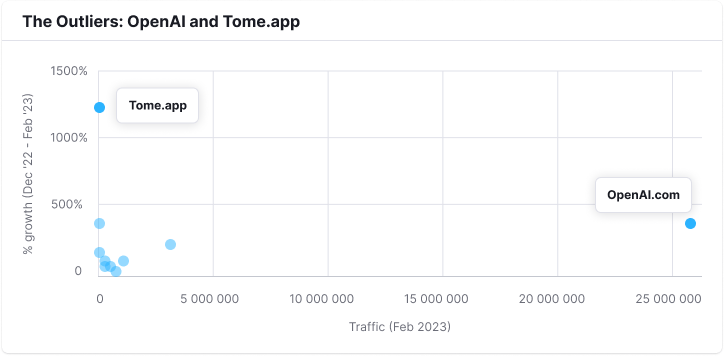“Google it” is a phrase everyone understands.
“Bing it” is a rarely-heard jokey line used by tech bros looking to make a point and get a cheap laugh.
But that’s changing. Bing is riding the “rising tide” of Chat GPT to a newfound popularity and relevance.
To quantify this, I dug into data from Datos, a global clickstream data provider focused on licensing anonymized, at scale, privacy compliant datasets. Their data offers insights into many aspects of digital behavior, including website traffic and search behavior. The results were dramatic:
- Visitors to Bing.com rose 32% in the six months from October 2022 through March 2023. During that time, the number of searches on Bing more than doubled (up 122%).
- In February and March of 2023, there were over 1.2 million sign-ups for the “new Bing” – an AI-powered Bing that promises: “Ask real questions. Get complete answers. Chat and create.”
- Downloads of the Edge browser increased nearly four-fold from January through March, highlighting Bing’s impact on Microsoft’s ecosystem as a whole
- A growing number of sites are using Bing to power their own search-related products or results
- Bing is actively promoting itself by stepping up their purchasing of paid advertising on other search engines – sending millions of users each month to Bing from Google and YouTube, and smaller amounts of traffic from social media sites and niche search engines.

“Bing it” isn’t poised to replace “Google it” as an everyday expression. But in the final analysis, every brand aspires to be a verb. For marketers, it is the ultimate sign that a brand has become completely synonymous with an activity.
Use of Google as a verb (more precisely, a gerund) started in 1998, when co-founder Larry Page signed off an email with “Have fun and keep googling.” But it took another four years for Google as a verb to go fully mainstream. The year 2002 saw the phrase first used on television (uttered by Willow from Buffy the Vampire Slayer), and being named “Word of the year” by the American Dialect Society.
Brands don’t become verbs overnight. Before a brand can dominate, it must be relevant. It must be the topic of conversation. Bing is far from dominating, but generative AI is breathing new life into Bing and the entire Microsoft ecosystem. And for the first time in a long time, it is causing people to rethink Google, and search more generally, as the dominant paradigm of how people navigate the Internet.
“Bing it” isn’t yet a thing. But we might be witnessing the start of a new era – a renaissance, one might even call it “a Bing-aissance.” Which, as nicknames go, isn’t bad. I asked Bing to come up with a catchy name for the trend of Bing becoming more popular, and it gave me The Bing Boom (my original name for this post), The Bing Thing, The Bing Swing, and The Bing Bling. My ability to feel intellectually superior to AI remains intact for another day. I’ll take it.



